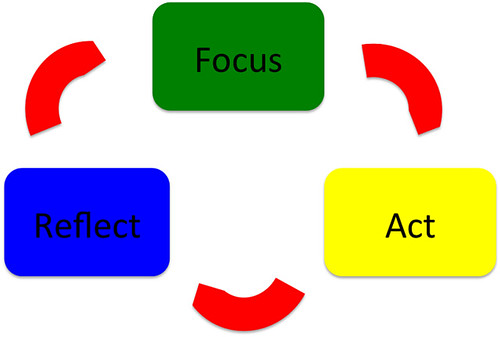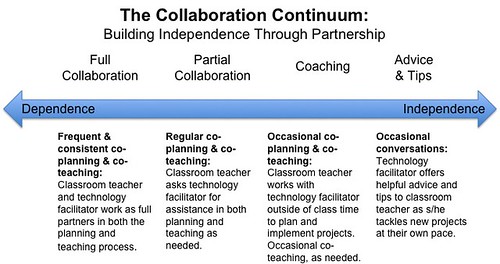As part of our organizational goal this year, all teams are participating in an action research project. Although each team is focusing in slightly different areas based on their needs and observations over the past year, the ultimate goal for all of us is improving student learning. We’re following a standard action research process:
Lucky for me, I’m on a team with my amazing new colleagues, Tara Ethridge and Jeff Utecht. Although we’ve only been working together for about a month, we were immediately on the same page about where to start: how to best support teachers that are willing to embed technology into classroom experiences – no matter what their level of technology proficiency might be.
After some thoughtful discussion, we settled on our focus question:
Does collaborating with teachers build the confidence needed to take the next step towards independently implementing future projects?
Along with the question, we thought some clarification might be needed about the world “collaboration,” as well as the term “next steps” and “independence,” so we came up with this continuum:
Of course, this is still a work in progress. What do you think? Would this be an interesting action research project? Does our continuum accurately represent the basic stages of growing independence with technology integration? Are we missing anything key?







the model assuming a certain level of ICT-literacy in classroom teachers. considering the discrepancy of familiarity/comfortability in using technology by teachers would be an advantage in evaluating the effectiveness of the technology itself. i have seen several cases where ill-fated users were afraid to raise the issue and seeks learning/development (in using technology) on the peer pressure.
I tend to sympathise with the comments by underexpose, in that before teachers can actually work with the IT facilitator, they need to see a ‘need’ and have developed some personal confidence in technology via training or some form of professional development activity. The rest I believe are accurate portrayals but just feel the initial step of getting staff to the stage that they even want to get involved in global projects should be addressed OR are you assuming that this is done.
@underexpose, @murcha,
Yes, for sure interest and relevance are key factors. This is just the preliminary planning. I think we’ll have to do some sort of survey or investigation to see where teacher’s minds are at in regards to technology. We’re definitely doing tons and tons of PD – aside from everything we do in school, we’re sending 14 teachers (just from the Elementary School) to Learning 2.008 in a few weeks.
To be honest, not everything is going to be a global project – we want to make sure we meet teachers where they are. Some of the things we do might be as simple as using the SmartBoard to increase interactivity in the classroom, or just building excellent critical thinking skills through internet research – everything needs to be differentiated for each teacher.
Also, one of the important pieces to me is the phrase “willing to embed technology,” I think we’re setting this up for those teachers that do already have an interest and level of readiness. However, we also need to address those that aren’t – but that might be a challenge for another year!
I think you’re on the right track. In my school there are interested teachers who would be at the start of the continuum and my hope is that I can help them move towards independence. I would use the diagram with these teachers so they could see what my goal would be for them.
My concern is the other teachers who don’t show any interest in using technology in their classroom let alone embedding it in the curriculum. Even though we are a technology rich school these teachers are not anxious to embrace using it with the students.
I like the continuum and think it does cover the collaborative spectrum fairly well. Also agree with @underexpose, @murcha – seems there is a level if Pre-collaborative readiness in which teachers are not engaged with technology yet or are totally dependent and will let me do something with their students but don’t yet engage in the process (thankfully, not many of these are left). I also think there is a “graduated expert” on the other end. I have a few teachers who have gotten to the point of being “mini-mes” and are so independent they can teach me or substitute for me with their peers.
It’d be interesting to see a continum for students as well- how good are we at teaching collaboration – moving them from divide and conquer mentatlity to actual collaboration and learning together. DO you have one of those too?
For an action research project, it will be interesting. I think a key part of your writing is that you have teachers that are willing – so that assumes a motivation to incorporate technology. You will have to gauge motivation as well as technology competency.
One suggestion for your Continuum – you indicate “planning and teaching” – you may want to consider “planning, learning, and assessment” – by focusing on “teaching” it brings attention to what the teacher is doing and tends to leave out what the students are doing. By wording it “learning” it will bring to the forefront what the students are doing (and what the teachers are doing to facilitate their learning). And, by explicitly including “assessment,” assessment enters the conversation – are we assessing what we are teaching and what students are learning?
I’m wondering if your “Advice and Tips” wouldn’t actually occur throughout – the idea of just in time support. And instead, what is at the end of the continuum is “Mentoring”, where you serve as a consultant offering expert advice when needed… There are some continuums and mentoring stances (coaching, collaborator, etc.) out there in the mentoring research – check out Lipton and Wellman’s “Mentoring Matters: A Practical Guide to Learning-Focused Relationships” (2003) – it may be useful to you.
I think sharing your Collaboration Continuum with the staff with whom you work will be key. One of the biggest problems I have with some of my staff is that they would prefer I plan/teach FOR them instead of WITH them. I tell my staff I am very willing to work with them to plan and teach, but some technology-resistant teachers just want me to do the work for them because they don’t “do” technology. Having a Continuum which helps define your scope of work and theirs will be very helpful. May I have your permission to adapt this idea for my staff?!
I like the idea behind this Kim. As an eLearning facilitator, some of my most influential activities have occurred in the mode you describe as ‘full collaboration’; however, I would note that full collaboration does not necessarily have to equate with dependence. I like the idea of full collaboration as a desirable model regardless of the ICT skills of the collaborators. Whilst collaboration can be the a means to increase teacher proficiency in the area of ICT, ideally it is a mutually-beneficial arrangement whereby both parties walk away with something significant. What it comes down to is how much time a school is willing to give to staff to work through such a model.
@Kimberly
Thanks! I love the idea of sharing the continuum with teachers so they know where they are and how to move forward. My only problem is that I don’t want anyone to feel pressure that they’re not moving fast enough, or that they should be on one end or another by a certain time.
@Elizabeth,
I love the idea of the “graduated expert” – and I really would envision that the teachers reaching that “end” of the continuum, would just loop back around and be a mentor/guide for the teachers just starting out at the beginning.
I also love the idea of a continuum for students – that will be really interesting! I’ll have to get started on that one next!
@ckendall,
Thank you so much for all your detailed feedback – I love the changes of wording you recommend and I’m on the hunt for a copy of the book already (not always so easy when you’re looking in Bangkok, but I’m sure I’ll find one somewhere).
You are more than welcome to adapt for your staff! Would you mind sharing what you create with us? I’m curious about what yours would look like too!
@Paul
You’ve hit the nail on the head with the “dependence” issue – collaboration is definitely a good thing and dependence definitely has a bad connotation. I need to re-word or maybe just remove the words? Plus, I think we should actually be able to move back and forth along the continuum as we learn new tools and new ways of teaching and learning with technology. Hmm… food for thought here.